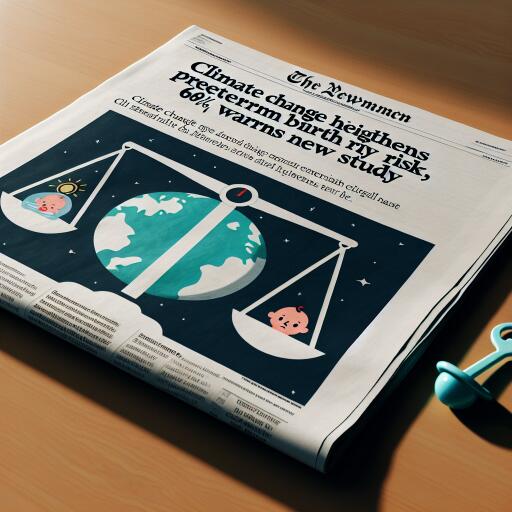
Climate Change Heightens Preterm Birth Risk By 60%, Warns New Study
In groundbreaking research that highlights the profound effects of climate change on human health, a study undertaken by a team of scientists from The University of Western Australia has unveiled startling insights. This comprehensive analysis, which sifted through the findings of 163 global health studies, has laid bare the intricate links between climate change and a slew of adverse health outcomes for children—an alarming increase in respiratory diseases, a rise in hospitalization rates, and notably, a 60 percent surge in the risk of preterm births triggered by exposure to extreme weather conditions.
Published in the distinguished Science of the Total Environment journal, this pivotal research stands as the inaugural endeavor to aggregate and scrutinize the collective scientific evidence surrounding the impacts of climate change on pediatric health. The study meticulously maps out the specific climate-induced extremities—ranging from bone-chilling colds to excruciating heatwaves, from unrelenting droughts to unpredictable heavy rainfall—and their subsequent health repercussions on the younger population.
“Weather extremes bear a significant burden on children’s health, with cold spells primarily causing respiratory ailments and erratic rainfall and drought conditions leading to inadequate nutritional intake and growth,” remarked one of the study’s leading figures. This assertion underlines the complex interplay between climatic anomalies and health vulnerabilities in children.
While the research predominantly draws upon data from affluent nations, a stern warning was issued regarding the pronounced susceptibility of children in lower-income countries. These regions, characterized by limited healthcare access, deficient infrastructure, and unstable food provisions, face the brunt of climate change’s health ramifications. However, the study also points to an uncomfortable truth: wealth does not confer immunity. Advanced economies, too, stand to battle a range of health threats catalyzed by climate variability, the intensity of which oscillates across different geographies and socio-economic strata.
The geographical factor emerges as a significant determiner of health outcomes, with the research illustrating distinct patterns. For example, Australia’s East Coast, Northern Territory, and Western Australia were identified as hotspots for increased preterm births due to extreme temperatures, whereas Queensland saw a spike in respiratory problems. A similar trend of heightened mortality was observed in South Africa, underscoring the global scale of this crisis.
The call for immediate action was loud and clear, with researchers advocating for stringent public health policies to mitigate the repercussions of climate-related diseases and a concerted global effort to curb anthropogenic climate change. “Climate change spares no corner of the globe and affects every individual, compelling us to bolster preventive measures against its health impacts on children,” expressed one researcher. This sentiment echoes the urgent need for a unified response to avert the looming threats poised to undermine the well-being of future generations.
As the evidence mounts, it becomes imperative for societies worldwide to heed these warnings and mobilize resources towards safeguarding children’s health against the ravages of climate change. The study not only sheds light on the most vulnerable and often overlooked demographic but also charts a course for potential interventions that could alleviate, if not avert, the dire health implications for children caught in the crosshairs of a changing climate.





Leave a Reply